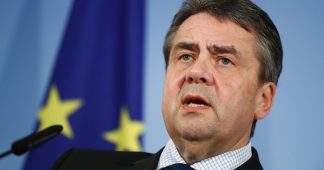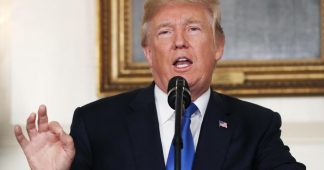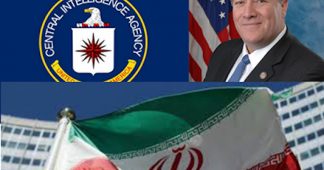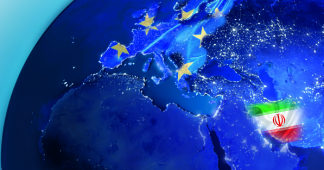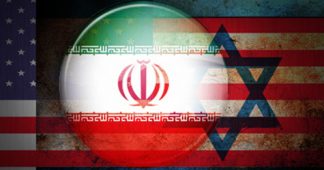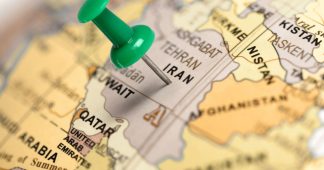By Keith Jones
13 January 2018
US President Donald Trump has publicly vowed to relaunch all-out economic warfare against Iran by no later than mid-May, unless the European powers join Washington in unilaterally rewriting the civil nuclear agreement between Tehran and the world’s great powers.
Trump’s incendiary pledge was the centerpiece of a bellicose anti-Iran statement issued Friday.
In it, the US president announced he was waiving, for a further four months, sanctions targeting Iran’s oil exports and freezing it out of the world banking system. Washington suspended these measures as part of the nuclear deal or Joint Comprehensive Plan of Action (JCPOA).
However, Trump insisted he will issue no further waivers unless the agreement is rewritten in accordance with his demands and coupled this with an ultimatum to America’s ostensible European allies—Germany, France, and Britain.
“Today,” said Trump, “I am waiving the application of certain nuclear sanctions, but only in order to secure our European allies’ agreement to fix the terrible flaws of the Iran nuclear deal. This is a last chance. In the absence of such an agreement, the United States will not again waive sanctions in order to stay in the Iran nuclear deal.”
He went on to warn the Europeans that if they did not quickly fall into line, he could blow up the JCPOA even before the next waiver deadline of May 12. Trump declared, “If at any time I judge” that a US-European agreement “to fix” the Iran nuclear deal “is not within reach, I will withdraw from the deal immediately.”
US repudiation of the JCPOA would set Washington on a fast-track for war with Iran—a country the Trump administration’s recent National Security Strategy placed on par with North Korea as a threat to US “national interests” that needs to be countered and vanquished.
Tehran has repeatedly said it will not be the first to break the terms of the deal it reached in 2015 with the five permanent members of the UN Security Council and Germany to dismantle much of its civil nuclear program in exchange for the lifting of punishing US and European Union economic sanctions. But it has warned that if the US abrogates the agreement and resumes its drive to destroy Iran economically, it will assert its full sovereign rights as it sees fit.
As it is, other more limited US sanctions and Washington’s repeated threats to scuttle the nuclear deal and roll back Iranian influence in the Middle East continue to roil the Iranian economy, with European businesses, in particular, wary of committing to substantial investments.
Iranian Foreign Minister Javad Zarif called Trump’s statement a “desperate” attempt “to undermine a solid multilateral agreement.”
European leaders avoided any immediate substantive comment, with Germany merely saying that it supports full implementation of the JCPOA and will consult Europe’s other major powers on a “common way forward.”
On Thursday, the German, French and British foreign ministers and EU foreign policy chief Federica Mogherini had all reiterated their support for the Iran deal at the conclusion of a meeting with Zarif.
In opposition to the Trump administration, the Europeans have insisted that differences with Tehran over non-nuclear issues, such as Iran’s role in Syria or its ballistic missile program, should not be tied to the JCPOA. They have further warned that Washington’s repudiation of the Iran deal would not only dangerously destabilize the Middle East. It would also send an incontrovertible signal to North Korea that there is no point in negotiating with Washington since it refuses to abide by international agreements.
In his statement, Trump demanded that the Europeans sign on to changes to the nuclear agreement that Iran would and could never accept. These include: allowing International Atomic Energy Agency inspectors immediate and unlimited access to any site, including military installations, anywhere in the country; eliminating the “sunset clauses” in the JCPOA so as make the time-limited restraints on parts of Iran’s civil nuclear program permanent; and severely limiting, if not outlawing, Iran’s ballistic missile program.
According to Trump officials, Washington has no plans for talks with Iran or for that matter with the non-European signatories to the Iran nuclear accord, Russia and China. Rather Washington intends to “negotiate” with the Europeans about endorsing Trump’s demands, with a view to a subsequent joint US-EU ultimatum to Tehran to accept them or face the re-imposition of economic sanctions.
Such an ultimatum would be illegal under the JCPOA and tantamount to an act of war.
Trump is also insisting that the US Congress pass legislation that would enshrine his key demands for unilaterally rewriting the JCPOA into American law. It would outline “triggers,” including in respect to the development of Iran’s ballistic missile program, that would cause the US economic sanctions suspended under the JCPOA to immediately “snap back” into force.
Trump’s statement was provocative and belligerent from beginning to end. It denounced Iran as the “world’s leading state sponsor of terror” and, in a revealing admission boasted that the US is “countering Iranian proxy wars in Yemen and Syria.”
Predictably, the billionaire, despot and Islamophobe repeated his obscene claims to be a champion of the Iranian people and their rights, even as he set the US on course for a military confrontation with Iran.
His statement was accompanied by the announcement of sanctions against 14 individuals and entities, including the Islamic Revolutionary Guard Corp’s cyber division. Sanctions were also imposed on the administrative head of Iran’s judiciary, Sadeq Larijani, supposedly in retaliation for the Iranian regime’s repression of the recent protests by impoverished workers and youth against rising prices, mass joblessness, government austerity, and rampant social inequality.
Trump also vowed yesterday that he will continue to refuse to certify that Iran is in compliance with the JCPOA, although the IAEA has repeatedly reported that Teheran is in full compliance and even top Trump officials have conceded Iran is implementing it to the letter.
According to press reports, National Security Adviser H.R. McMaster, Defense Secretary James Mattis, and Secretary of State Rex Tillerson had to bring considerable pressure to bear on Trump to persuade him not to blow up the Iran accord this week by refusing to sign the four-month sanction waiver.
There is strong support in both the Republican and Democratic Party leaderships for a more aggressive stance against Iran, beginning in Syria, where Tehran’s support for Assad played a major role in the failure of US efforts to use al-Qaeda aligned Islamist forces to install a pro-US regime. But there are grave concerns within the US military-security and political establishments about Trump’s haste to tear up the Iran nuclear accord and provoke an all-out confrontation with Iran.
These concerns are entirely of a tactical character, revolving around how best to achieve US global hegemony. Leading strategists for US imperialism argue Iran needs to be “contained,” through a combination of military, economic and diplomatic pressure, while the US concentrates on countering more formidable rivals, Russia and China. And there are deep concerns Trump’s push for a confrontation with Iran will intensify the growing strategic rift with Europe.
Yesterday’s ultimatum to Europe over Iran, which Trump’s advisors prevailed on him to issue in preference to a unilateral US withdrawal from the Iran nuclear accord, only underlines the divergence between NATO’s principal member states.
Apparently Trump, or at least those egging him on to scuttle the Iran deal, are calculating that the Europeans will ultimately ally with the US against Iran for fear that they could themselves become targets if the US again seeks to use its domination of the world financial system to block trade with Iran.
The Europeans, for their part, have their own imperialist designs in the Middle East and beyond. With Germany in the lead, they are pursuing rearmament and seeking to develop EU military forces that can act independently of, and if need be, in opposition to America.
Since sanctions were lifted on Iran, European companies have announced billions in new investments, even if, as of yet, many of these haven’t been fulfilled due to fears of a renewal of US sanctions.
More broadly, the EU fears the incendiary consequences of a US-Iran war, which would quickly embroil the entire Mideast. Europe is both far more dependent on Mideast oil than the US and far more susceptible to the political and demographic shocks such a war would engender.
While hostile to the growth of Iranian influence in parts of the Middle East such as Syria and Iraq, the European imperialist powers are alarmed by Washington’s readiness to inflame sectarian tensions whether by promoting a Saudi-led anti-Iran Sunni alliance or recognizing Jerusalem as Israel’s capital.
Stefan Kornelius, foreign editor of German daily Süddeutsche Zeitung, pointed to the strategic divergence between the US and the major EU powers when he wrote Friday, “Iran is pursuing an expansive foreign policy course. Europe must find a different answer to that than the United States, which is causing damage with its clear siding with the Gulf monarchies.”
